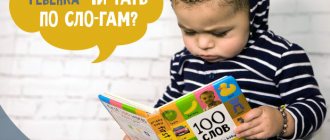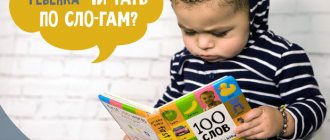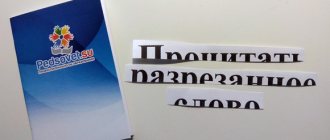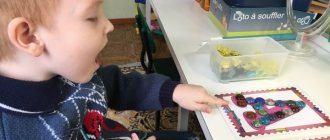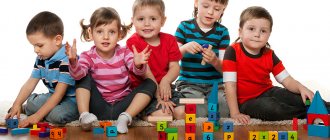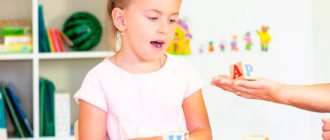PROJECT “SPEECH THERAPY GAMES”
I. _ stage
- prephonemic
II . stage
– phonemic
Prephonemic stage
At the 3rd week, the newborn begins to react to the voice.
By 4 months, reaction to the voice and intonation of spoken speech.
By 5 months, the child grasps the general rhythmic, melodic structure of the word.
At 9-10 months - a reaction to the intonation and meaning of some words. From this time on, the self-learning mechanism begins to work.
From the age of 11 months, the child distinguishes contrasting sounding words ba-ba, pa-pa, ma-ma.
From 11-12 months, phonemic hearing begins to develop. At this time, phonemic hearing allows:
understand the speech of others;
imitate others;
establish a connection between words and objects.
Phonemic stage
By the age of 2, the child differentiates all speech sounds only by ear, and understands well the speech of an adult addressed to him.
By the age of 5-6 years, children already differentiate all sounds both by ear and in pronunciation.
Research by N.H. Shvachkin is confirmed by literary sources and other authors (M.I. Lisina, E.O. Smirnova, V.V. Vetrova, etc.)
In parallel with phonemic hearing, which carries out the operations of discrimination and recognition of phonemes, phonetic hearing also develops, which carries out “monitoring of a continuous stream of syllables.” Phonemic and phonetic hearing together make up speech hearing,
which carries out not only the reception and assessment of other people's speech, but also control over one's own speech. Speech hearing is the most important stimulus for the formation of normalized pronunciation, which can only be carried out with coordinated work between the mechanisms of auditory control and reception on the one hand and control of speech movements on the other.
The functional unity of speech perception and speech production is mentioned in the works of N.I. Zhinkin, N.Kh. Shvachkina, V.I. Beltyukova, A.A. Leontyeva and others.
Even during the birth of phonological theory, the largest linguist Baudouin de Courtenay pointed out that the structure of a phoneme is determined by both acoustic and motor components.
Investigating the patterns of development of children's speech, A.N. Gvozdev notes that the general course of a child’s assimilation of the sound side of speech is determined by the joint action of the auditory and motor spheres: “The auditory sphere is leading in the sense that thanks to the early development of hearing, the child learns to distinguish various phonetic elements by ear; their exact auditory representations become a regulator for their development in his own pronunciation. But for their appearance in the child’s own speech, in addition to auditory ideas, articulatory skills are also needed... These skills are developed later, and with their development, sound elements freely enter into the child’s own speech. From this side, the development of the motor sphere turns out to be decisive for the entire course of mastering the phonetic aspect of the native language. A.N. Gvozdev “A child’s acquisition of the sound side of the Russian language,” Moscow 1948)
Tasks:
- find out the educational needs of parents and their level of competence in matters of speech development, establish contact with its members, and agree on the educational impact on the child;
- develop and test a system of methodological activities for parents on the speech development of preschool children through the organization and conduct of the “Speech Therapy Workshop” club;
- create a speech therapy piggy bank for parents “Home Speech Therapist”;
- develop and accept uniform requirements for parents and children, a common approach to education.
Project description: strategy and mechanism for achieving the goal
Work on interaction between a speech therapist and parents on the speech development of children takes place in 3 stages:
Stage 1 – preparatory (information and analytical)
Tasks:
- find out the educational needs of parents and their level of competence in matters of speech development, establish contact with its members, and agree on the educational impact on the child;
- start collecting methodological materials (information bank) for the “Home speech therapist” piggy bank;
- develop and accept uniform requirements for parents and children in matters of speech development.
To solve these problems, we begin work with a questionnaire (see Appendix 1). Having obtained the real picture, based on the collected data, you can analyze the characteristics of the family and family upbringing of the child, identify the level of competence of parents in matters of speech development, and develop tactics for your communication with each parent. This will help to better navigate the pedagogical needs of each family and take into account its individual characteristics.
At this stage, it is also necessary to begin collecting and developing a “Home Speech Therapist” collection: teaching materials in accordance with the mental and age characteristics of children.
The preparatory stage includes the establishment of uniform requirements of the speech therapist and parents for the correction process.
Stage 2 – main (practical)
Tasks:
- develop and test a system of methodological activities for parents on the speech development of preschool children through the organization and conduct of the “Speech Therapy Workshop” club;
- replenish and supplement the speech therapy piggy bank for parents “Speech therapist at your home”;
- The knowledge and speech skills of children acquired during classes with a speech therapist are consolidated in a playful way in everyday life. Project means and methods;
- conducting a workshop seminar, master classes, consultations, round tables, “parents’ living rooms”, holding competitions (speech talkers, readers), holding a festival of beautiful and expressive speech and other forms of work of the Speech Therapy Workshop club (monthly);
- conducting individual consultations (if necessary);
- creation of an information and methodological stand “Cribs for Parents” (monthly, theoretical material on topics);
- presentation of a piggy bank for parents “Home speech therapist” (monthly, practical material on topics);
- maintaining a “Success Diary” (monthly, by parents) (see Appendix 3).
Stage 3 – final (control and diagnostic)
Tasks:
• Analyze the effectiveness of a speech therapist teacher’s work with parents on issues of children’s speech development.
• Analyze the effectiveness of correctional work with children in the process of organizing the Speech Therapy Workshop club.
Appendix 2
SUCCESS DIARY
___________________________________________________________________________________________________________________________________________________________________________________________________________________________________________________
academic year
| Month | Recording a child's success |
| September | |
| October | |
| November | |
| December | |
| January | |
| February | |
| March | |
| April | |
| May |
Long-term plan for the implementation of the “Home speech therapist” project
| Np/p | Term | Forms and methods of work | The content of the work | Result | Responsible |
| 1. Preparatory stage | until September 20 | 1. Questioning parents | Studying the level of competence of parents in matters of speech development | Questionnaire for parents | Speech therapist |
| 2. Collection of teaching materials | Selection of materials on the topics “Breathing gymnastics”, “Articulation exercises”, “Fine motor skills”, etc. | Money box “Home speech therapist” | Speech therapist | ||
| 2. Main stage | October | Round table "Why does a child speak incorrectly." | Exchange of opinions, analysis of questionnaires, education of parents about the causes of speech deviations. | Round table protocol, feedback from parents | Speech therapist |
| November | Master class “Exercises for developing the muscles of the speech apparatus” | Recommendations for performing articulation gymnastics | Protocol for the master class, reviews from parents, production of booklets “Recommendations for conducting articulation gymnastics” | Speech therapist | |
| December | Seminar workshop “We play with our fingers and develop speech” | A message about the relationship between speech development and fine motor skills of the hands, recommendations for finger exercises | Protocol of the workshop, feedback from parents | Speech therapist | |
| January | Consultation “Speech breathing is the basis of correct speech” | Thematic consultation with a practical part | Protocol of consultation, feedback from parents | Speech therapist | |
| February | Master class “Learn to hear sounds” | Teaching a set of exercises for the development of phonemic hearing in children | Protocol of the master class, reviews from parents | Speech therapist | |
| March | Reader/speaker competition | Demonstration of oratorical and creative abilities by parents using interesting speech material | Protocol of the master class, reviews from parents | Speech therapist Music hand | |
| April | Parents' lounge "Parents about their children" | Exchange of impressions of parents about the corrective influence on the child at home | Protocol for the parent living room, feedback from parents | Educators Speech therapist | |
| May | A holiday of beautiful and correct speech | Demonstration of speech skills acquired in class | Protocol of the holiday, reviews from parents | Speech therapist Music director | |
| Monthly | Presentation of the speech therapy box “Home Speech Therapist” | Replenishing the piggy bank with new materials for use at home according to the club’s plan | Card index of games and exercises by topic | Speech therapist | |
| Monthly | Individual consultations | Providing assistance to parents on issues of interest to them | Parent consultation log | Speech therapist | |
| Monthly | Design of the information and methodological stand “Cribs for Parents” | Theoretical material aimed at developing parents’ knowledge about the peculiarities of children’s speech development | Speech therapist | ||
| Monthly | Keeping a “Success Diary” | Parents' recording of children's achievements in speech development | "Diary of Success" | Speech therapist | |
| 3. Final stage | April | Monitoring (questioning) of speech therapist’s work with parents | Identification of the level of parental competence in matters of children's speech development | Questionnaire for parents | Speech therapist |
| May | Children monitoring | Identification of the level of speech development of children Presentation of the project “Speech therapy workshop” | Final diagnostic data for children | Speech therapist |
- Babina E.S. Partnership between preschool educational institution and family in speech therapy work. Speech therapist 2005 N 5.
- Dushkina N.D. Sinkwine in work on the development of speech in preschool children. Speech therapist 2005 N 5.
- Zhukova N.S., Mastyukova E.M., Filicheva G.B. Speech therapy. Ekaterinburg, 1998.
- Mironova S.A. Effective speech of preschool children in speech therapy classes. M. 2007.
- Fomicheva M.F. Teaching children correct pronunciation. M. Voronezh, 1997.
- Filicheva T.B. “Fundamentals of Speech Therapy” M. Prosveshchenie 1989.
- Khvattsev M.S. Speech therapy. Working with preschoolers. M. 1996.
Practical significance of the project
It consists in the fact that the proposed system of step-by-step inclusion of parents in the correctional and speech therapy process, the developed work plan of the “Speech Therapy Workshop” club, methodological aids for home use by parents - the “Home Speech Therapist” piggy bank, diagnostic material for identifying the competence of parents on issues of speech development, developed The “Success Diary” form for parents to record their child’s achievements can be implemented by teachers, speech therapists and interested parents.
Expected results:
Parents are actively involved in the correctional and developmental process to eliminate children’s speech deficiencies at home and record their achievements in the “Success Diary”.
Parents independently use materials from the “Home Speech Therapist” collection.
Through a survey, the need to increase the pedagogical competence of parents in matters of child speech development was revealed.
| For children | For parents | For teachers | For preschool educational institutions |
| positive dynamics of speech development; successful social adaptation in preschool educational institutions and family; individual approach to each child. | positive assessment of the activities of the preschool educational institution; readiness and desire to help preschool educational institutions; using knowledge on children’s speech development at home and especially in the summer | positive psychological climate between the speech therapist and teachers; teachers' interest in creativity and innovation; satisfaction with one's own activities; a well-organized system of advanced training; taking into account positive dynamics in the development of children in terms of speech development when certifying teachers | favorable conditions for the professional growth of teachers; increased status of preschool educational institution |
